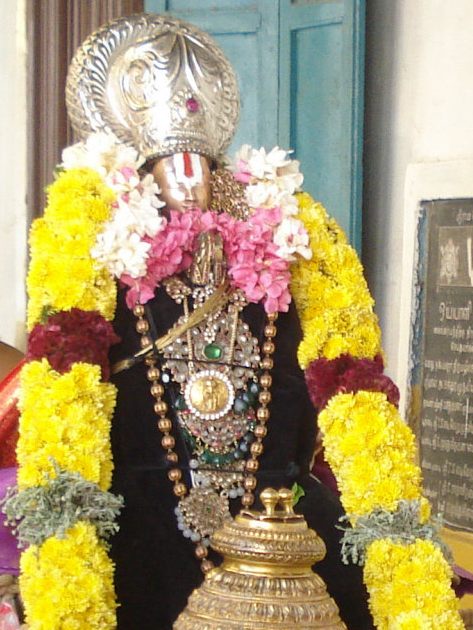Published from “Three Minutes” series written by A.S.Rajagopalan Swami of Ohio
nin aruL en pAladE nanRAga nAn unnaiyinRi ilEn kaNDAi
nAraNanE nI ennaiyanRi ilai.
(tirumazhisaiyAzhvAr, nAnmugan tiruvantAdi – 7)இன்றாக நாளையே யாக, இனிச்சிறிதும்
நின்றாக நின்னருளென் பாலதே, – நன்றாக
நானுன்னை யன்றி யிலேன்கண்டாய், நாரணனே
நீயென்னை யன்றி யிலை.
nAraNanE = Lord shrIman nArAyaNa, nin = Your nanRAga = very magnificent aruL = blessings
en pAladE = is on me (always) nAn = I ilEn = cannot exist unnaiyinRi = without you
nI = You (also) ilai = cannot stay ennaiyanRi = without me kaNDAi = (it is) understood
This verse is sung by tirumazhisaiyAzhvAr, 4th in the AzhvAr dynasty. Unlike the others, he intensely explored other philosophies before finally arriving at shrIivaiShNavam and realized that Lord shrIman nArAyaNa is the sole, indisputable, and eternal authority. Here, tirumazhisaiyAzhvAr states that without any doubt, Lord’s blessings is showered all the time. He says that he cannot exist without Him and that the Lord Himself cannot exist without the AzhvAr. That is the universal truth, but he has realized this only now. nAraNan in Tamil is the shorter form of nArAyaNan.
TirumazhisaiyAzhvAr, in a human form, needed and depended on God, who is understandable to most people. But isn’t it paradoxical, when he says that the Lord needs him and can’t stay without him? Here lies the shrIvaiShNava philosophy buried implicitly in a nutshell. God is the omnipotent, singular, pervasive, eternal, and master soul (paramAtmA or Ishvaran). Infinite number of human beings, animals, and even plants are all individual souls (jIvAtmA or cit), which are also eternal. But individual souls always depend on and exist to serve the master soul, God.
The saMskR^it word nArAyaNa has several interpretations. Among them, two stand out significantly. First one says nArANAm + ayanam, meaning that He is the supporter of everything in the universe. Second one is nAra + ayanam, meaning that He dwells inside everything.
In AzhvAr’s statement, “I am not without You”, he refers to the concept that Lord is the universal supporter and that without Him, existence is meaningless. Furthermore, in his statement, “You are not without me”, he mentions that the Lord is inside everyone’s body and that God coexists with each individual’s soul. Such an intricate concept of the Lord’s internal and external presence as well as the relationship between Him and the individual soul is brought out so effortlessly by this AzhvAr .
By exploring the AzhvAr’s tamizh works, svAmi vedAnta deshikan is able to derive the meanings of convoluted concepts described in saMskR^it vedas. Both tamizh veda- s and saMskR^it veda-s express the same concept, but tamizh veda-s state these ideas in a simple, brief and unequivocal manner. We consider both veda-s as authorities and call them together as dual (ubhaya) veda-s.
The moral here is
1. We need the Lord.
Without Him, even an atom can’t move. He needs us, because we are an inseparable part of Him and He can’t shrug us.
2. He needs us too.
To sing, pray, write, meditate etc. and spread His glory. Some would even jokingly say that Lord kR^iShNa preached the gItA and said “I am the the Lord”, but only very few listened. But ANDAL, another AzhvAr , in Her tiruppAvai said kR^iShNa is the greatest and everyone lined up, listened, and realized. Sometimes, His devotees may have more influence than He does. That also, is His wish.
Nothing ever exists entirely alone; Everything is in relation to everything else.









